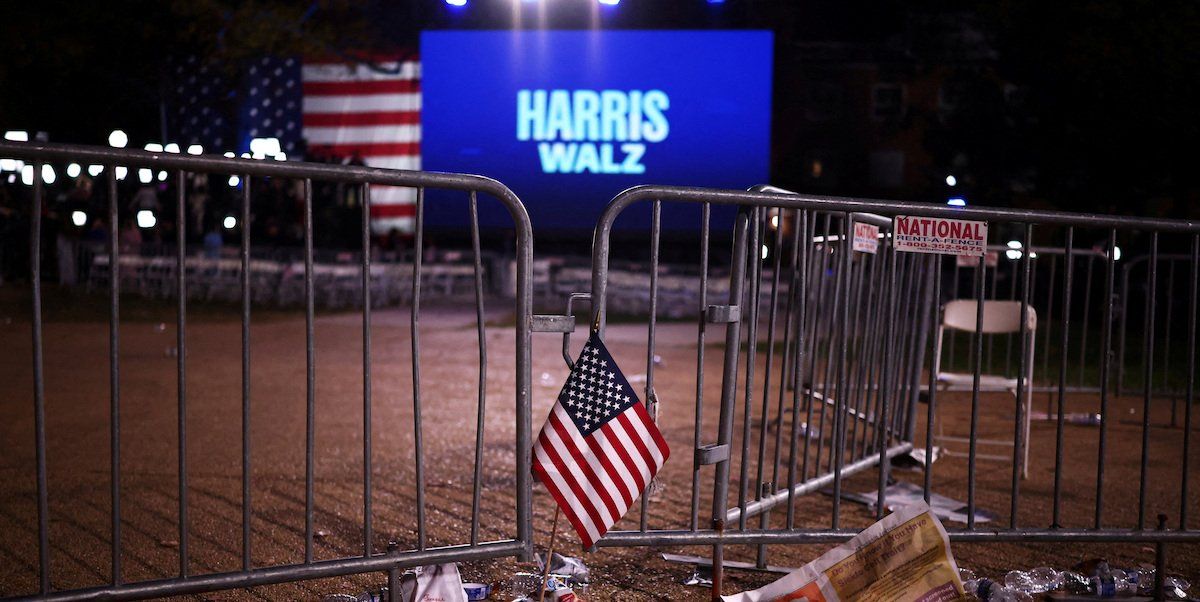One month out from the election, the dust is settling around Democrats’ new reality. The final outstanding congressional race was called on Wednesday, solidifying Republican control of the House and Senate. Meanwhile, Donald Trump is entering the White House after winning the Electoral College and the popular vote, and the conservatives hold a majority on the Supreme Court.
But enough about the Republicans. We get it, they’ve got a lot of power. So, where do Democrats go from here?
Analysts are still picking apart exactly what doomed Kamala Harris in the last election, but it’s clear that the Democrats bled base voters. Trump made gains among Black voters, Latino voters, and voters who make under $50,000 a year. These groups are at the heart of who the Democratic Party sees itself as serving and standing for, leaving the party “listless and leaderless,” according to Eurasia Group US analyst Noah Daponte-Smith. “The shift toward Trump among ancestrally Democratic voters has really jolted the party,” he adds, but what will they take away from this reckoning defeat?
In the short term, the Democrats will undergo a leadership transition, and new faces are likely to skew younger. Part of this is generational, as the party’s “old guard” of Nancy Pelosi and Chuck Schumer fade from the scene. Lining up to take their places are representatives like Alexandria Ocasio-Cortez, who is poised to win control of the powerful House Oversight Committee and is far more politically adroit than her fellow progressive “Squad” members. Meanwhile, governors whose names were floated to replace Joe Biden’s on the ticket — including Gavin Newsom, JB Pritzker, Gretchen Whitmer, and Josh Shapiro — will spend the next four years positioning themselves for a fierce primary fight in 2028.
In the long term, Democrats will be looking to win back the House in 2026, which Daponte-Smith predicts “should be eminently possible” thanks to Republicans having only a narrow majority and because the opposition party almost always makes gains after losing a presidential election.
“That will allow them to block the Trump legislative agenda in 2027-28,” he says, “and will give them the gavels to conduct investigations, as they did in the first Trump term.” A win in the House would give them renewed hope going into 2028. That being said, if they don’t win, true panic will set in.
But sometime between then and now, Democrats need to find clarity on their platform. The problem? There is no consensus on what led to their downfall in this election. While Harris’ defeat has some Democrats ready to start from scratch, many blame her loss on the party moving too far left and alienating dependable Democrats in the center. Others believe that the party’s message was fundamentally sound, but Biden’s late withdrawal and unpopularity doomed Harris from the get-go. Meanwhile, supporters of Bernie Sanders echo that the party lost because they left the working class behind.
Daponte-Smith says his big question about the Democrats’ next platform is which parts of the Trump 2.0 agenda they concede, like how Biden maintained Trump’s China tariffs. Potential contenders, in his view, could be RFK’s Make America Healthy Again agenda or a more restrictive stance on immigration.
We will get some clarity on the Democrats’ new direction on Feb. 1, when the party elects a new chair. Back in 2016, this election turned into a proxy fight between progressives and mainstream Democrats. This time around, it has the potential to be the same. So far, the field remains wide open, with four candidates who have officially put their hats in the ring and a dozen or so others whose names are being circulated. We will be watching this race as it will undoubtedly be an inflection point for how the party plans to move past their disastrous 2024 performance.
